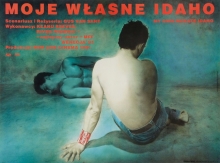Moje własne Idaho
Aleksandra Łukomska, Paulina Skitaniak
Studentki Instytutu Filologii Angielskiej Uniwersytetu Wrocławskiego (pod kierunkiem dr Justyny Deszcz-Tryhubczak)
„Moje własne Idaho” (1991), tak, jak i inne filmy Gusa Van Santa, wzbudził wiele kontrowersji, ale przez krytyków i publiczność został bardzo dobrze przyjęty. Van Sant umieszcza w filmie Szekspirowskie motywy, kino drogi, surrealistyczną wyobraźnię i niebanalne role dwóch młodych aktorów, Keanu Reevesa i Rivera Phoenixa.
Głównymi postaciami są Mike Waters (River Phoenix) i Scott Favor (Keanu Reeves). Ci młodzi mężczyźni należą do dwóch odmiennych światów. Pierwszy cierpi na narkolepsje i jest porzucony przez matkę, a drugi pochodzi z zamożnej rodziny. Obaj zajmują się męską prostytucją. W końcu rodzi się między nimi przyjaźń, która ze strony Mike’a powoli zamienia się w miłość. Razem podróżują po kraju, poszukując matki Mike’a i ciesząc się nieokiełznaną wolnością. Jednak Scott decyduje się na drastyczną zmianę swojego dotychczasowego życia. Zakochuje się w młodej Włoszce i odziedzicza fortunę po zmarłym ojcu, tym samym odcinając się od życia na ulicy. Wydaje się, że ten krok całkowicie wymaże z jego pamięci przeszłość i starych znajomych, których wcześniej nazywał jedyną swoją rodziną.
Sam tytuł filmu zaczerpnięty został z utworu zespołu The B-52. Reżyser interesował się marginesem społecznym, barwnymi postaciami włóczęgów, outsiderów, ludzi funkcjonujących na granicy prawa. Akcja filmu odbywa się równolegle na kilku planach. Jeden z tych planów to opowieść o samotnym, nadwrażliwym, nieprzystosowanym do życia w społeczeństwie Mike’u, który rozpaczliwie pragnie miłości, w bardzo niefortunny sposób lokując swoje uczucia w przebojowym, aroganckim i samolubnym Scotcie.
Ten melodramatyczny, gejowski wątek Van Sant przeplata filmem drogi, w którym bohaterowie mogą być bezdomni, ale zawsze cieszą się wolnością. Van Sant wprowadza też do opowieści motywy Szekspirowskie. Postać Boba, mentora męskich prostytutek, jest zaś odzwierciedlenie Falstaffa z „Chimes at Midnight” (1966) Orsona Wellesa.
Film przedstawia nie tylko seksualną stronę prostytucji młodych homoseksualistów, ale także psychologiczną. Poprzez prostytucję Scott wyraża swój bunt przeciwko ojcu oraz manifestuje odcięcie się od tradycji starszego pokolenia. Przez to poszukuje również swojej tożsamości. Mike, z drugiej strony, szuka miłości, bliskości i akceptacji. Dokładnie tego, czego nie otrzymał od rodziców.
Rodzice bohaterów nie są dla nich dobrymi wzorcami i nie zapewniają im wsparcia. W rezultacie młodzieńcy są osamotnieni. Mogą polegać tylko na sobie. Ukazany w filmie obraz dzieciństwa daleki jest od niewinności i sielanki. W filmie można jednak dostrzec pozytywny i optymistyczny przekaz. Pomimo ciężkiego, wręcz brutalnego życia, w którym bohaterowie działają poza granicami prawa i sprzedają swoje ciała, można odnaleźć szczere i dobre uczucia. Jest to na przykład miłość, którą Mike obdarza Scotta. Istnieje również nadzieja. Mike nie poddaje się, pozostając ciągle „w drodze” i poszukując szczęścia.
„My Own Private Idaho” (1991), typically of other films directed by Gus Van Sant, has raised a lot of controversies, but it was well received by critics and the audience. Gus Van Sant combines into one entity such diverse elements as Shakespeare, the road movie, surreal imagination and the remarkable roles of two young idols, Keanu Reeves and River Phoenix.
The main two characters in the film are Mike Waters, played by River Phoenix, and Scott Favor, played by Keanu Reeves. The young men belong to two different worlds – the former suffers from narcolepsy and is abandoned by his mother; the latter comes from a wealthy family. Both are male prostitutes. The friendship they share becomes love on the part of Mike. They are traveling across the country, seeking Mike’s mother and enjoying unbridled freedom. However, Scott’s world begins to tempt him. The boy is to be the heir to the family fortune and will soon have to make a dramatic choice. Scott finds love in Italy and inherits a huge fortune, which prompts him to abandon his life on a street. It seems that this step completely erases from his memory the importance of his former friends, whom before he actually called his family.
The title of the film was taken from the song of a popular band, The B-52. Van Sant creatively adapts the language of the music video to feature film, using typical video clips surreal poetics, musical rhythm and fast installation. The director is also interested in the social margins, i.e. colorful drifters, outsiders, people operating on the fringes of the law. The plot „My Own Private Idaho” is divided into several parallel planes. One of these planes is the story of the lonely, hypersensitive, socially alienated Mike, who desperately wants love and invests his feeling in the edgy, arrogant and selfish Scott. This melodramatic gay thread is mixed with the road movie, whose characters may be homeless but they nevertheless enjoy freedom. Van Sant also introduces Shakespearean motifs. Bob, the mentor of a group of male hustlers, represents Falstaff. In his choice of Falstaff Van Sant also alludes to „Chimes at Midnight” (1966), directed by Orson Welles.
The film presents not only sexual but also psychological aspects of homosexual prostitution of young people. Scott expresses his rebellion against his father and rejects the tradition of the older generation. He also searches for his identity and tries to define himself. On the other hand, Mike seeks love, affection and acceptance, which he did not get from his parents.
The characters do not get a good role model from their parents. Consequently, they feel a deep loneliness. They can rely only on themselves. This image is far from that of an innocent and idyllic childhood. However, the film’s message is to some extent optimistic. Although life is harsh and brutal, the characters often act as criminals, and sex is on sale, there still exists real love (Mike’s affection for Scott). There is also a hope. Mike is not giving up: he is still on the road, pursuing happiness.

